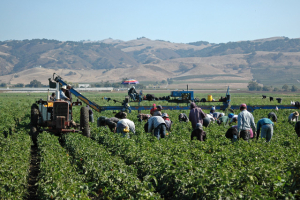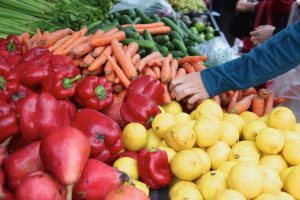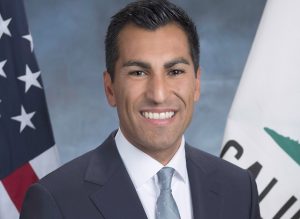Opening Remarks: Developing Sustainable Foodsheds to Improve Food Access and Nutrition
July 9, 2009 Michael R. DimockGood morning everyone. My name is Michael Dimock. I am President of Roots of Change and one of your co-hosts for the next two days. It is a great pleasure to have you all here. I would like to make some remarks about Roots of Change and what we hope will emerge from our work here together. ROC, as we call it, is working to create a sustainable food system in California by the year 2030. This convening is an example of one of our primary activities.
ROC convenes because it is an effective way to support a network. And that is what we are; we are a network of grass tops and grass roots leaders united and guided by common vision and a broad set of concrete goals. The network's activity is fueled by a fund, the ROC Fund. The fund results from the contributions of foundations, government, and individuals who share our goals. ROC was in fact founded by philanthropies and two of the founders, Susan Clark of Columbia Foundation and Bruce Hirsch of the Heller Foundation, are here with us. I encourage you to reach out to them if you are interested in ROC's origins.
As I said, ROC's network, is united by a vision of a sustainable system. In our envisioned system
· People of all income levels have access to healthy food;
· Agriculture and processing systems do not degrade the health of ecosystems, livestock, and humans who produce or eat the food;
· More wealth is produced from the system and that wealth is shared in a way that ensures that all of those working within it, from field hand to financier, feel both well respected and fairly compensated and thus remain committed to their careers in the system; and
· A diversity of operational scales and ownership are maintained to ensure economic resilience.
Despite the recent growing public interest, we feel that food and agriculture are still dangerously undervalued and under appreciated. That is why we love Michele Obama's and Maria Shriver's gardens, and what they do to raise the important issues related to nutrition, education, and food production. We are greatly encouraged and energized by the food and agriculture priorities of the President, Secretaries Vilsack and Kawamura, and the Mayor of San Francisco, Gavin Newsom.
We agree with these leaders who clearly understand that to make food systems relevant to the population it must be linked to health: health for people (particularly children), communities, and the environment. You will find here at this summit copies of our Declaration for Healthy Food and Agriculture. This document lays out 12 principles that, if followed, would create a food system that is biologically integrated, socially just, and financially viable.
ROC uses the concepts of values and principles often in our work because we believe that people create things based on their mental models of how the world works. Values and principles describe our behavior-shaping beliefs and thus merit thorough discussion.
Based on our values and principles, ROC has committed over $6 million – and more is on the way – to be used for contracts, fellowships, grants, and for more meetings like this. These philanthropic investments are meant to ignite new thinking about food, farming and fisheries in a single generation; and to scale up models of sustainable production, processing and distribution. We believe the evidence suggests that our approach is working.
In the last 10 months, over 8,500 Californians have shown their commitment to work with ROC by joining our network. In addition, the Packard Foundation has recently joined the Columbia, Heller and Kellogg foundations as a core funder. And with this summit, government has now become a financial partner and we are working on several more collaborative efforts with federal and state agencies.
Our network and projects span the State. We are working with Secretary Kawamura on the Ag Vision in Sacramento and with the grass roots organizers in San Diego who run the City Heights Farmers Market, about which you will learn more this morning. We are working closely with Mayor Gavin Newsom and 50 regional leaders from agriculture, business and government (25 based in the city and 25 the country) on a groundbreaking project to seed formation of a regional foodshed. Mayor Newsom will mention the San Francisco Urban-Rural Roundtable, as the project is called, in his remarks. So it is logical that we are thrilled to work with USDA on this meeting about foodsheds and enhanced access to good food and nutrition.
This meeting embodies our hope for the development of regional foodsheds in California as a central component in the effort to produce good food for all people, rich or poor. We think the concept of the foodshed is timely and appropriate. We offer in the program a draft definition for a foodshed.
But, fundamental to formation of foodsheds is a change in how our culture thinks about progress. Unfortunately, the current concept of "best and highest use," a term of trade in the real estate business, does not yet include agriculture. Farming and ranching are seen as a temporary economic stage that will end when the land is developed for other commercial activity. ROC believes that the mental model that frames agriculture as impermanent is no longer appropriate or sustainable. Rather, as they do for watersheds, communities must begin to plan for permanent food production regions and infrastructure that will ensure fresh, healthy and diverse food supplies for as long as humans hope to inhabit this planet.
Essential infrastructures need not be publicly owned and operated, although this may be appropriate for certain components of a foodshed. From primary production points on farms, ranches and in fisheries, to processing and distribution, private enterprise will likely remain the primary driver of foodshed activity. However, as with other industries and societal needs today, including agriculture, the public sector could provide key investments or incentives for private investment in strategic elements of a functional foodshed system.
ROC also offers the concept of a foodshed management plan for your consideration. A foodshed management plan could become the vehicle for illuminating the practical path to foodshed development and maintenance for cities, counties or regions. ROC has offered the draft definitions for foodshed and foodshed management plan in order to spawn a process of thorough analysis and finally development of broadly accepted definitions that could guide lawmakers, agencies, planners, and producers working to create regional food and farming networks. I will be hosting an open space session on the definitions later today.
Keeping those concepts in mind, I want to close by clarifying the intention of this meeting. The planning team has had two overarching goals in mind. The first is to enhance your knowledge, thinking, and action as you scale up your efforts to new levels, in order to serve larger and larger segments of the country.
The second goal is to offer public and private funders with recommendations that will help you to accelerate your work. The second goal is especially important to me as an organizer attempting to facilitate collaboration and scaling of pilot projects. I will admit that I carry a certain bias. I believe that the current context calls for the business, nonprofit, and government sectors to develop a level of partnership, not seen since the Great Depression and World War II. I further believe that more entities like ROC are needed in all parts of the nation to act as agents for pooled public and private funds that can be used to green the nation's food system.
Most all of us in this room are engaged in work that would be greatly enhanced by more integration of efforts among entities, more pooling of capital, both and social and financial capital. More aggregation capital will provide capacity to massively scale up existing projects, some of which you will explore in 12 case studies and 2 plenary sessions. We offer these 14 sessions as real world food for thought to ignite your inquiry and analysis.
To fulfill the second goal, ROC will generate two memos in the weeks ahead. The first memo will be sent to both private philanthropies and public agencies. It will offer your recommendations for alterations to existing programs or formation of new programs that would ensure more progress in the field.
The second memo will be sent to national policymakers who will be highly influential over any follow on to – or augmentation of – the Economic Recovery and Reinvestment Act of 2009. If the economic recovery stalls out due to the continuing decline in employment, we will need more action on the part of the federal government, philanthropy and the private sector.
ROC believes that regional food system development must be seen as another engine to drive formation of a green economy, in the way that retooling the energy sector is already seen. Therefore, we will send a memo to the Secretaries of Agriculture and Labor, the Director of the Office of Management and Budget, and the leaders of Congress. This memo will contain your recommendations for regional food system investments that will create more jobs and better health. We believe these recommendations should seek to pool public funds with meaningful match from philanthropy. We all hope that a second priming of the economic pump will not be needed, but now is the time to plan for any contingency.
So this is important work before us. We are convening for a serious set of reasons and we appreciate your willingness to dig in together, with an open mind, a good spirit, and a strong desire to serve the nation as well as your own projects.
So those are my framing comments. I know I speak for the entire planning team when I offer you our very best wishes for a productive time.



